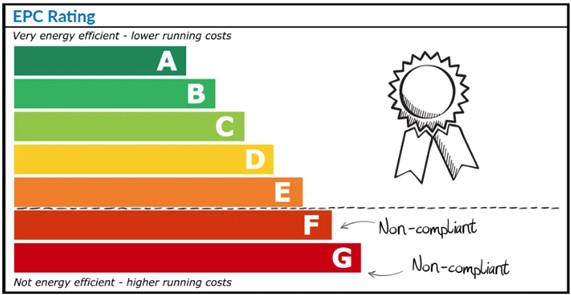Arthian Explains Energy Performance Certification
26th June 2025

Arthian Explains Energy Performance Certification
By Neil Thorburn, Arthian’s Senior Energy Engineer
EPC History
EPCs (Energy Performance Certificates) were introduced in 2007 as a method to rate buildings’ carbon emissions and energy consumption. For non-domestic buildings the EPC rating reflects the carbon emissions with a scale running from “G” for a very poor building to “A+” for zero carbon or better buildings.
The Compliance Team within the Arthian Energy Group has been producing EPCs since their introduction and has produced thousands of certificates for a wide variety of building sizes and complexities throughout the UK.
EPC Calculation
An EPC is referred to as an asset rating because it focuses on the physical characteristics of a building – its geometry, fabric, heating, cooling & ventilation systems and lighting – and not how it is operated by its users. The EPC software makes assumptions about temperature setpoints, lighting levels and hours of occupation depending on the activities assigned to the zones within the building, to calculate a building’s rating.
DECs (Display Energy Certificates) use actual building consumption data to calculate an operational rating for buildings.
MEES
MEES (Minimum Energy Efficiency Standard) legislation was introduced in 2018 and requires non-domestic buildings to have an EPC rating of E or better before being let. This level is proposed to increase to “D” in 2025, “C” in 2027 and “B” in 2030. This will have a huge impact on the commercial letting market with many building owners unable to legally rent out their non-compliant buildings.
Arthian already has many years of experience in advising clients on how to cost effectively improve their buildings’ EPC ratings to comply with MEES requirements. We are very well placed to help with the tougher MEES requirements coming in the future.
EPC Changes
EPCs were designed 18 years ago when they were legally required for a building which was sold or leased and, for non-domestic buildings in Scotland, accessed by the public. There are now plans to update their format with additional metrics to make them more informative, user friendly and suited to the requirements of MEES as well as Net Zero targets:
- Inclusion of a fabric performance indicator reflecting insulation and air infiltration levels.
- A heating system figure providing information on efficiency and environmental impact.
- Smart readiness, assessing the suitability of a building’s control systems to optimise energy consumption with emissions and financial benefits.
- Energy use and cost included rather than just an emissions figure.
- It is also proposed that EPCs’ validity period will be reduced from 10 to 5 years and that there will be increased quality control by an independent body, both steps to ensure certificates’ accuracy.
- The information available from the governments’ EPC register will be increased to allow wider assessment of building’s emissions and energy performance.
- EPCs have always included appropriate emissions and energy saving recommendations (which there is no obligation to implement). Scottish EPCs have included an EPC rating if these measures were implemented and this likely to be required for the rest of the UK.
- Stronger control and penalties for properties which do not have appropriate energy compliance reports.
Many of these features have already been confirmed for Scottish EPCs. Revamped EPCs will require additional training and professional development for EPC assessors. In addition, it is possible that an MEES assessor qualification will be created to reflect the importance of that scheme.
Consultancy Services (CS1) Framework and the Retrofit & Decarbonisation (N9) Framework
Public bodies such as local authorities; social landlords; councils and trusts can benefit from SWPA’s Retrofit & Decarbonisation (N9) Framework and Consultancy Services (CS1) Framework. These frameworks are set up to allow these public bodies access to a wide variety of approved, high-quality contractors and consultancies. The contractors and consultancies will be locally based with a recognised history of expertise and delivery in their relevant fields.
Arthian are approved to produce EPCs for a number of other LHCPG’s regional frameworks. Much of this accreditation is due to our long history of supplying EPCs to public bodies such as local councils, housing associations, NHS health boards and emergency services throughout the UK.









 Previous
Previous 
